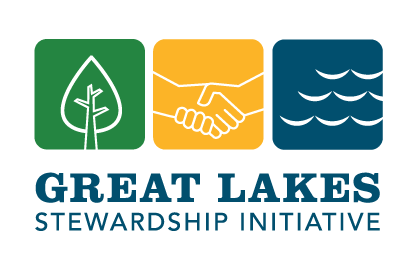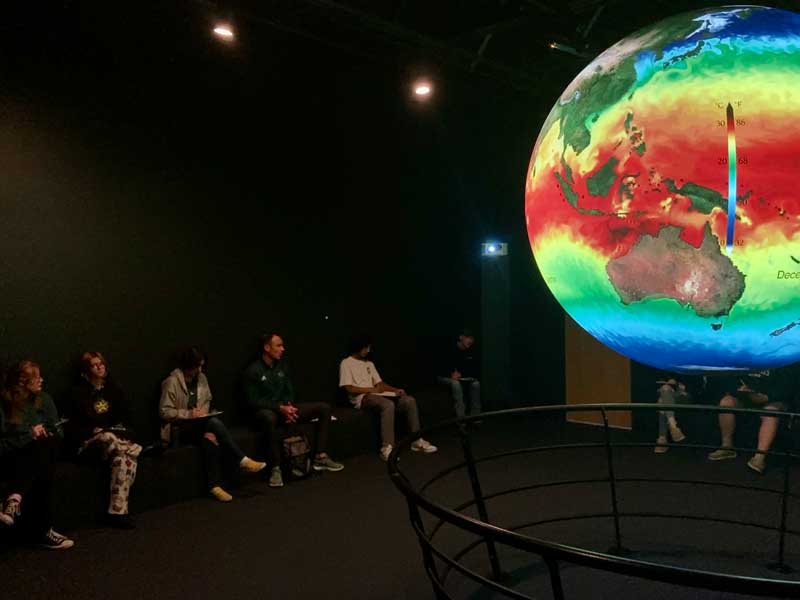Submitted by Daniel Moffatt, Thunder Bay National Marine Sanctuary
Students, educators, and the community have the opportunity to participate in the collection of water samples to improve our understanding of and enhance the discussion of climate change education in the Great Lakes. Since early 2022, staff at Thunder Bay National Marine Sanctuary have partnered with NOAA’s Great Lakes Environmental Research Laboratory scientists to establish a long-term monitoring program to measure Lake Huron water chemistry related to freshwater acidification. Funded by NOAA’s Ocean Acidification Program, middle and high school students became community scientists as they collected water samples and then shipped those samples to scientists at the laboratory. Scientists compile the data to provide a seasonal assessment of acidification within the region. The raw data is shared with the students to learn how to interpret, organize, and report on data, and also improves NOAA’s understanding of freshwater acidification and its potential impacts to natural and maritime heritage resources within the sanctuary.
***
Since early 2022, staff at Thunder Bay National Marine Sanctuary have partnered with NOAA’s Great Lakes Environmental Research Laboratory scientists to establish a long-term monitoring program to measure Lake Huron water chemistry related to freshwater acidification and climate change. Funded by NOAA’s Ocean Acidification Program, a noteworthy element of this project is engaging students and educators in the sampling and analysis of freshwater acidification data to enhance discussion of climate change education in the Great Lakes. On the water, middle school students became community scientists by collecting water samples, which were then shipped to scientists at the laboratory, where they are compiling the data to provide a seasonal assessment of acidification within the region. The data collected during this project will then be used by the students to learn how to interpret, organize, and report on data, and will also improve NOAA’s understanding of lake acidification and its potential impacts to natural and maritime heritage resources within the sanctuary.
In November of that year, NOAA Research Ecologist Dr. Reagan Errera, co-Principal Investigator on the project, virtually joined an Alpena High School earth science class to introduce the project to even more students. Errera has completed field programs and laboratory experiments examining acidification and its impact on the ecosystem in both the freshwater and marine environments.
In April of 2023, she joined another class, this time in person, and spoke about the importance of data collection to better understand lake acidification in terms of a changing climate. Dr. Errera’s presentation included graphs of data interpreted from the collected samples throughout the 2022 season.
This long-term, intra-agency program engages students, educators, and the community in locally relevant science research while establishing a baseline understanding of freshwater acidification in the Great Lakes. It will also inform follow-up studies into climate-related impacts to sanctuary resources and could be a model for management-focused monitoring of acidification throughout the Great Lakes.


Wow! This looks like really cool field work for the students. I’m really interested in the device used to collect the viable samples. Was it pretty simple to use? Did it take multiple tries sometimes? What ways have students been able to use the data? Also, what is Science on a Sphere?! That looks awesome!
Hey Jacinda! I see that the research scientist is at the Great Lakes Environmental Research Laboratory which is in Ann Arbor. If you are interested in speaking with her, maybe Daniel Moffat can connect you!
I’m a sucker for students using real-world data! This project sounds really engaging, and I’d love to know if NOAA is monitoring acidification in Lake Michigan as well.
What a neat opportunity for these students! Seems like something that they will remember for a lifetime. The river cruise sounds so fun for them!!